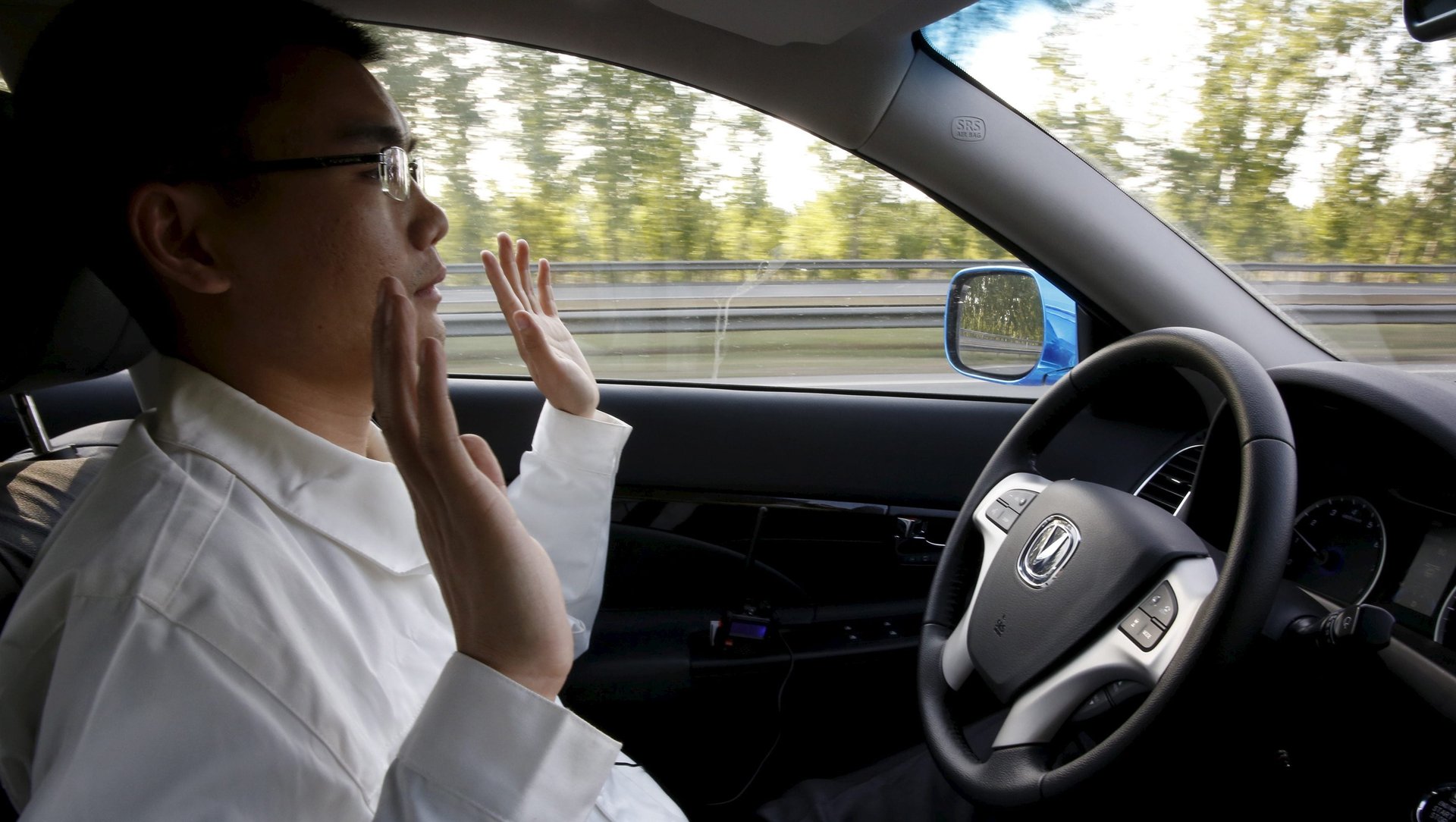Two very new Chinese startups are competing with tech giants to make self-driving taxis a reality
The world’s tech giants are competing to put self-driving taxis on the roads as soon as this year—and so are two very new startups.


The world’s tech giants are competing to put self-driving taxis on the roads as soon as this year—and so are two very new startups.
On Jan. 28, Pony.ai, a year-old startup, said it was starting public test drives of its autonomous vehicle in the southern Chinese city of Guangzhou, which has opened some streets to such trials (paywall). Two days later (link in Chinese), JingChi, less than a year old, launched a similar road test program that will run for three months. It’s unclear how people are being selected for the test drives or how many have participated in the test drives—Quartz has reached out to both companies for more details.
Both companies were founded by former executives at Baidu, the Chinese search giant that is now hoping that self-driving technology will revitalize its fortunes (paywall). It showcased its open-source Apollo autonomous driving platform last July, and live-streamed a road test in Beijing in July 2017, even before the capital had finalized its rules for testing the technology. Pony.ai was founded by two engineers from Baidu’s self-driving unit, while JingChi was started by Wang Jing, the former chief of Baidu’s self-driving unit, a fact that’s resulted in a Waymo-Uber-style lawsuit.
In a video Pony.ai released in January, it showed one of its vehicles navigating Guangzhou’s Nansha district on a rainy day. There was a man in the driving seat, but not touching the wheel.
Pony.ai has so far put six vehicles through a three-kilometer (1.8 miles) (links in Chinese) road test. Only available through “internal reservations” right now, Pony.ai hopes to roll out a ride-hailing program for local citizens to try out self-driving in Nansha. There will be a driver and a technician (link in Chinese) in the vehicle in the road tests open to the public.
Founded in December 2016, the company has been developing level 4 autonomy technology—the second-highest level in autonomous driving, which allows a vehicle to run without driver input on certain types of road. It previously conducted a number of road tests in California after obtaining approvals there in June 2017. In January this year, it secured funding of $112 million led by Hong Kong and Chinese venture capitalists in January this year. Pony.ai’s co-founders, James Peng and Lou Tiancheng, both began their careers at Google before becoming top engineers in Baidu’s self-driving unit.
JingChi is conducting its tests on Guangzhou International Biotech Island, which covers an area of 1.8 square km (445 acres). It takes the car around 15 minutes (link in Chinese) to circle the island.
The test came even though JingChi’s founder Wang, who left Baidu in March 2017 and started his own company the following month, has been embroiled in an intellectual property lawsuit brought by his former employer in December for. Baidu referred Quartz to this news report (link in Chinese) on the dispute. According to the report, Baidu alleges Wang violated several clauses of his contract with the company, including a non-compete agreement, and is infringing on its self-driving technology. Wang has previously said the suit is without merit. Quartz will update the piece with comments from JingChi when we hear back.
JingChi completed its first road test in June, and received $52 million in funding in September. It has said wants to produce up to 1,000 self-driving cars in 2018, and provide hundreds of autonomous taxis to China’s central Anhui province the same year, according to (link in Chinese) state media Xinhua.
Still, it’ll be rather hard to catch up to Waymo, the autonomous vehicle division of Google’s parent company Alphabet, which is also planning to roll out its first public ride-hailing service this year. The company tested its vehicle without a driver in the driving seat in November 2017, and has racked up 4 million test miles, half of those last year. Uber, meanwhile, is planning to launch self-driving taxis in selected US cities in 2019. In China, ride-hailing giant Didi Chuxing has also been testing two self-driving vehicles in Shanghai for several months (paywall) on a purpose-built testing track, while Baidu is looking at a driverless bus.
But who gets on the road first commercially will depend as much on how quickly regulations progress, as on technology. More than 30 states in the US have introduced legislation on autonomous driving including rules for road tests, according to the latest data. On the regulatory front, China is lagging, according to Yvette Lin, an analyst with Taiwan-based consultancy TrendForce.
In December, Beijing became the first Chinese city to allow autonomous driving road tests. According to Lin, cities like Shanghai, Hangzhou, Chongqing, and Wuhan could follow Beijing’s lead in the second half of 2018.